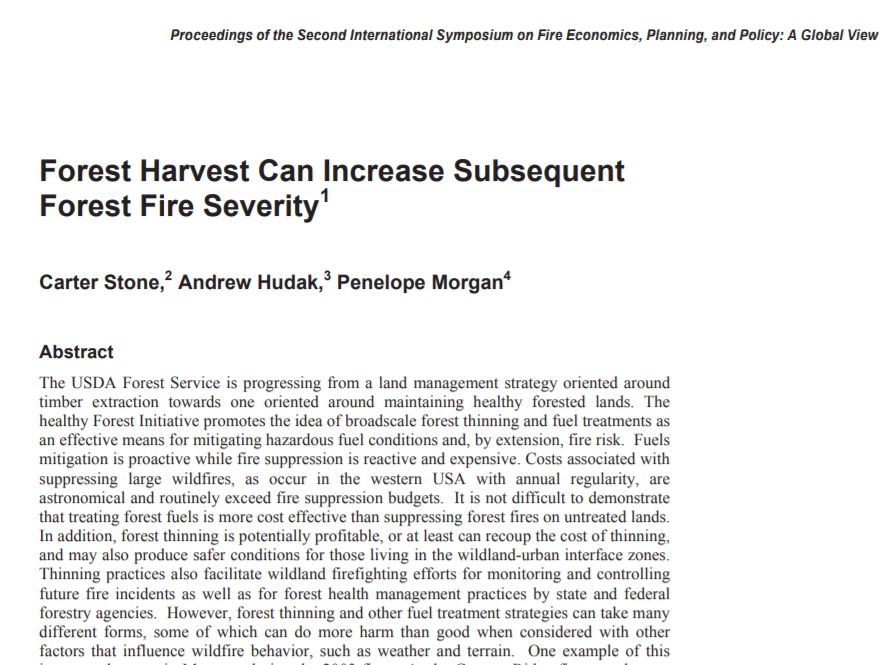Bit late to the party on this, but I think it& #39;s worth disentangling the *very broad* set of practices that get called "forest management." 1/ https://twitter.com/Acosta/status/1305575210872168448">https://twitter.com/Acosta/st...
IE, the timber lobby can use "forest management" to mean clear-cutting, which can actually make fires worse.
Every forest system& #39;s different, but in general:
-logging slash=dessicating fuel
-regrowth after logging=short, thick, fire-vulnerable growth 2/
https://www.fs.fed.us/psw/publications/documents/psw_gtr208en/psw_gtr208en_525-534_stone.pdf">https://www.fs.fed.us/psw/publi...
Every forest system& #39;s different, but in general:
-logging slash=dessicating fuel
-regrowth after logging=short, thick, fire-vulnerable growth 2/
https://www.fs.fed.us/psw/publications/documents/psw_gtr208en/psw_gtr208en_525-534_stone.pdf">https://www.fs.fed.us/psw/publi...
"Forest management" can also mean prescribed burns, a practice widely used the indigenous peoples of California before anglo authorities outlawed it. 3/ https://www.theguardian.com/us-news/2019/nov/21/wildfire-prescribed-burns-california-native-americans">https://www.theguardian.com/us-news/2...
It can mean "thinning"--which ranges from back-door logging (bad because the big, valuable trees loggers want are also the older, fire-resilient ones best kept growing), to minor treatment to make overgrown forests safer for prescribed burns. 4/ https://daily.jstor.org/does-forest-thinning-work/">https://daily.jstor.org/does-fore...
More "forest management" is something California and the feds have already agreed on (important, because the feds controls 57% of our forested land, and led the century-long fire suppression regime that contributed to our present problems) 5/ https://www.gov.ca.gov/2020/08/13/california-u-s-forest-service-establish-shared-long-term-strategy-to-manage-forests-and-rangelands/#:~:text=sub%20menu%20toggle-,California%2C%20U.S.%20Forest%20Service%20Establish%20Shared%20Long%2DTerm%20Strategy,to%20Manage%20Forests%20and%20Rangelands&text=The%20Agreement%20for%20Shared%20Stewardship,of%20forest%20land%20per%20year.">https://www.gov.ca.gov/2020/08/1...
. . . but "forest management," done well, is a way of relieving the fire burden from past *mis*management.
It& #39;s not a substitute for climate action.
Up in the PNW there are rainforests burning RN that are *not* fire-adapted ecosystems. 6/ https://twitter.com/ErinEARoss/status/1305309358192914433?s=20">https://twitter.com/ErinEARos...
It& #39;s not a substitute for climate action.
Up in the PNW there are rainforests burning RN that are *not* fire-adapted ecosystems. 6/ https://twitter.com/ErinEARoss/status/1305309358192914433?s=20">https://twitter.com/ErinEARos...
Climate change is real, and it is effing up our forests in tons of ways:
-warmer winters=more reproductive cycles per year for pinebeetles
-worse droughts=more dead trees
-record-breaking heat waves = more-intense, damaging fires. 7/
-warmer winters=more reproductive cycles per year for pinebeetles
-worse droughts=more dead trees
-record-breaking heat waves = more-intense, damaging fires. 7/

 Read on Twitter
Read on Twitter


